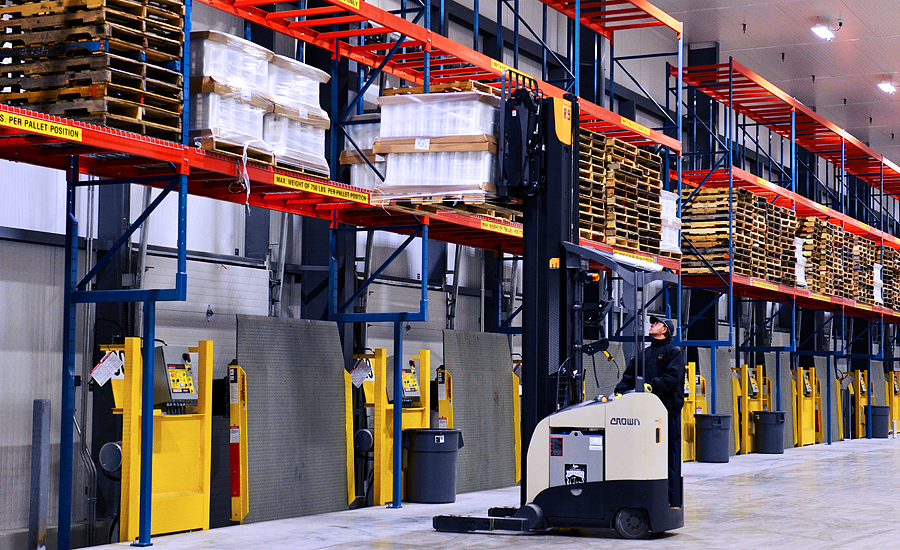Temperature-Controlled Warehousing in Wisconsin: Preserving Quality in a Chilly Climate
Jan 26, 2024
BlogWisconsin, known for its frigid winters, is a hub for the food and pharmaceutical industries. To safeguard the quality and safety of products in these challenging conditions, the state boasts a robust network of temperature-controlled warehousing solutions. These facilities include cold storage warehousing, refrigerated warehousing, climate-controlled warehousing, and frozen storage warehousing. In this article, we will explore the significance of each of these warehousing types in Wisconsin.
- Cold Storage Warehousing
Cold storage warehousing is essential in a state like Wisconsin, where temperatures can plummet during the winter months. These facilities maintain temperatures ranging from 0°F to 35°F and are primarily used for storing perishable goods such as fruits, vegetables, and dairy products. The cold storage facilities in Wisconsin are equipped with advanced refrigeration systems and storage solutions to ensure product quality and safety. They play a crucial role in supporting the state’s agriculture and food processing industries, ensuring that produce stays fresh and safe for distribution throughout the year.
- Refrigerated Warehousing
Refrigerated warehousing offers a more flexible temperature range compared to cold storage. Temperatures in these facilities typically range from 35°F to 55°F, making them suitable for a wide range of products, including fresh produce, dairy, and beverages. Wisconsin’s refrigerated warehousing facilities are well-equipped with state-of-the-art cooling and temperature monitoring systems, helping maintain the freshness and quality of temperature-sensitive goods.
- Climate-Controlled Warehousing
Climate-controlled warehousing is designed to maintain a constant temperature, regardless of external weather conditions. These facilities are critical for industries like pharmaceuticals, electronics, and aerospace, where strict temperature and humidity control are necessary to preserve product integrity. Wisconsin’s climate-controlled warehouses use advanced climate control systems and are strategically located to serve various industries across the state. These facilities ensure that sensitive products remain in optimal condition, even during the harsh winter months.
- Frozen Storage Warehousing
Frozen storage warehousing plays a crucial role in preserving and distributing frozen products, such as meat, seafood, and ice cream. These facilities maintain temperatures below 0°F, ensuring that products remain safe and free from spoilage. Wisconsin’s frozen storage warehouses are equipped with blast freezing capabilities, enabling rapid temperature reduction to maintain product quality. These facilities are essential for the state’s agriculture and food processing sectors, guaranteeing a continuous supply of frozen products year-round.
Key Advantages of Temperature-Controlled Warehousing in Wisconsin
- Agricultural Support: Wisconsin’s temperature-controlled warehousing facilities play a pivotal role in supporting the state’s agriculture industry by preserving the quality of crops and dairy products.
- Year-Round Distribution: The cold and frozen storage warehousing options ensure that products can be distributed even in the harshest winter conditions.
- Industry Diversity: These facilities cater to a wide range of industries, from food and pharmaceuticals to electronics and aerospace.
- State-of-the-Art Technology: Wisconsin’s warehousing facilities are equipped with cutting-edge technology for temperature and humidity control, ensuring product safety.
- Strategic Locations: The state’s warehouses are strategically located to serve industries across the region, making distribution more efficient.
Conclusion
Temperature-controlled warehousing is indispensable in a state like Wisconsin, where extreme weather conditions can pose challenges for various industries. Cold storage warehousing, refrigerated warehousing, climate-controlled warehousing, and frozen storage warehousing all play essential roles in preserving product quality and safety. These facilities not only support the agriculture and food processing industries but also cater to a diverse range of sectors. Through advanced technology and strategic placement, Wisconsin ensures that temperature-sensitive products can be stored and distributed year-round, helping maintain the state’s reputation as a key player in the Midwest’s economic landscape.


 Dave McGowan has been a member of the WEL Family since May 1989. He is a husband and father of two children. Dave is also a U.S. Army veteran and served in Vietnam in 1971-1972, and he attended driving school soon after he was released from the military in 1974.
Dave McGowan has been a member of the WEL Family since May 1989. He is a husband and father of two children. Dave is also a U.S. Army veteran and served in Vietnam in 1971-1972, and he attended driving school soon after he was released from the military in 1974. During his career with WEL, Phil has worked as a driver, dispatcher, terminal manager and customer service manager. He says he always was a driver first, though non-driving jobs taught him financial management that helps him as an owner-operator.
During his career with WEL, Phil has worked as a driver, dispatcher, terminal manager and customer service manager. He says he always was a driver first, though non-driving jobs taught him financial management that helps him as an owner-operator.